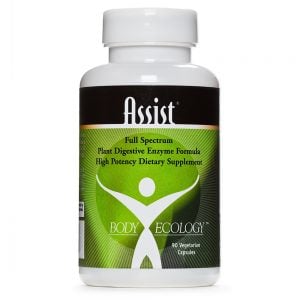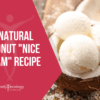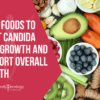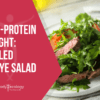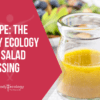Is It True That You Begin to Digest Coconut Oil in the MOUTH? And Other Reader Questions
Wow! When we posted an article on coconut oil, we never expected to receive so many great follow-up questions.
These days, coconut oil is extremely popular. For many, it’s not just a cooking oil—it’s also a superfood.
Coconut oil is highly recommended on the Body Ecology Diet because it is antimicrobial, vegan, and easy to digest. If you have a hard time digesting fat, a full-spectrum digestive enzyme like Assist can help.
Why? Well, coconut oil is:
- A saturated oil that is very stable (and safe) at high temperatures.
- Vegan, so anyone can enjoy its benefits.
- Antimicrobial, meaning it fights bad bacteria and yeast.
- Extremely easy to digest!
Did you know that the fatty acids in coconut oil move passively (without any help from bile salts) from the digestive tract into the bloodstream? This makes coconut oil a good choice for just about anyone who is cleansing, fighting Candida overgrowth, or repairing the gut lining.
We Begin to Digest Coconut Oil—In the Mouth?
The best part about coconut oil is that it contains fatty acids that naturally fight bacterial and fungal infection. Coconut oil’s antimicrobial activity is strongest once we break the oil down into its fatty acid building blocks. The great news is that this begins immediately in the mouth.
Ambur F., a fan of the Body Ecology Diet on Facebook, writes:
Fat digestion starts in the stomach but mainly occurs once in the small intestine, had I answered the question on my anatomy test last week with fat digestion starts in the mouth I would have gotten it marked wrong. Not sure where she got her information. Just passing on what my book and teacher both say on this subject.
While it is true that we mostly digest fat in the small intestine, there are actually lipase enzymes in the mouth.
These enzymes are called lingual lipase.
Lingual lipase was first discovered in 1973. (1) It is released along with saliva. Recent reports tell us that it may help us detect how much fat is in food. (2)
In fact, the presence of lingual lipase helps to explain why the ancient practice of oil pulling is so effective! (3) When fat (like coconut oil) has been broken down in the mouth by lipase enzymes, the fatty acids released are extremely antimicrobial. (4)
If We Begin Digesting Fat in the Mouth, Do We Need to Supplement?
Tara M., another fan of the Body Ecology Diet on Facebook, asks:
If this [lingual lipase] enzyme is in our saliva, why would we need the additional supplement?
This is a great question because it reminds us of the Principle of Uniqueness! The Body Ecology Principle of Uniqueness tells us that we all have unique needs, and these needs change over time. What one person requires for optimal health may not match another person’s requirements.
In order to figure out how you digest fat, it is best to listen to your body.
Signs of difficulty digesting fat include:
- Queasiness after eating a fatty meal
- Floating stool
- Stool that is sticky or has a strong odor
- Stool that appears loose, fatty, or greasy
The good news is that even if you are not producing the enzymes that you need to break down fat, lingual lipase (released in the mouth) and gastric lipase (released in the stomach) only kick start fat digestion. The main show happens in the small intestine, usually with the help of the gallbladder.
If you have trouble digesting fat, chances are you will need extra support from a full-spectrum enzyme supplement.
This touches on the question asked by Margaux R.:
So what’s the best way to consume coconut oil? Through cooking or in mouthfuls?
Whether you cook with coconut oil or swallow it in mouthfuls, you activate the release of lingual lipase. The difference is in the amount.
Unless you chew your coconut oil before you swallow it, you will get the most antimicrobial benefits from eating coconut oil with food. This is because the release of lingual lipase enzymes (in the mouth) breaks down coconut oil into antimicrobial fatty acids.
In other words, we recommend using coconut oil while preparing foods—rather than quickly swallowing it!
Can Coconut Oil Aggravate Bacterial Overgrowth?
Finally, Tiffany L. asks:
Coconut products are high on the FODMAP and not recommended for SIBO. Any thoughts on this? I’m SO confused!
FODMAP foods are foods that contain short-chain sugars:
- Oligosaccharides, like galactose and lactose
- Monosaccharides, like fructose
- Sugar alcohols, or polyols
These foods will easily ferment in the gut when the inner ecosystem is wounded—or out of balance. Keep in mind that the list of FODMAP foods is long; you won’t necessarily react to each and every FODMAP food.
Small intestinal bacterial overgrowth (SIBO) is one example of a wounded inner ecosystem. Like the name implies, it is an overgrowth of bacteria specifically in the small intestine. SIBO can cause all kinds of discomfort, ranging from heartburn and upper abdominal cramping to constipation or diarrhea.
While most coconut products do contain fructose (a FODMAP), coconut meat is also high in dietary fiber and feeds microbes in the digestive tract. High fiber foods can be a nightmare for those with irritable bowel syndrome (IBS) or SIBO.
Coconut meat is the fleshy white part of the coconut found in:
- Shredded coconut
- Coconut flakes
- Coconut flour
- Coconut milk
Here’s the thing to remember about coconut products: Coconut oil is an oil and contains no fiber for microbes to feed on. Coconut water kefir is fermented, so probiotics get to the sugar and fiber first during the fermentation process.
Both coconut oil and coconut water kefir are recommended on the Body Ecology Diet. Both help heal a wounded inner ecosystem and fight infection in the gut.
What To Remember Most About This Article:
Coconut oil is a popular oil for cooking and is also considered a superfood. It is a saturated oil that is stable and safe at high temperatures; it is vegan; it is antimicrobial to fight harmful bacteria and yeast; and it is very easy to digest.
Coconut oil exhibits strong antimicrobial activity when it is broken down into fatty acid building blocks, a process that begins in the mouth. If you have difficulty digesting fat—with symptoms like queasiness after a fatty meal and greasy stool—you may need a full-spectrum enzyme supplement to provide extra support.
Coconut oil is a Body Ecology recommended choice for anyone cleansing, fighting Candida overgrowth, or repairing the lining of the gut:
- You will receive the greatest antimicrobial benefits when you eat coconut oil with food—lingual lipase enzymes in the mouth help to break coconut oil down into antimicrobial fatty acids.
- Keep in mind that coconut meat may not be well tolerated by those with irritable bowel syndrome or small intestinal bacterial overgrowth.
- Coconut oil and fermented coconut water kefir can still be enjoyed on the Body Ecology Diet to improve gut health and fight gut infection.
- [product id=”13″]
- [product id=”3″]
REFERENCES:
- Hamosh, M., & Scow, R. O. (1973). Lingual lipase and its role in the digestion of dietary lipid. Journal of Clinical Investigation, 52(1), 88.
- Kulkarni, B. V., & Mattes, R. D. (2014). Lingual Lipase Activity in the Orosensory Detection of Fat in Humans. American journal of physiology. Regulatory, integrative and comparative physiology.
- Asokan, S., Rathinasamy, T. K., Inbamani, N., Menon, T., Kumar, S. S., Emmadi, P., & Raghuraman, R. (2011). Mechanism of oil-pulling therapy–In vitro study. Indian Journal of Dental Research, 22(1).
- Hughes, P. I., Kealey, C., Rowan, N. J., & Brady, D. B. (2013). Evaluation of Vegetable Oils and Their Respective Fatty Acids on the Viability of Streptococcus Mutans, a Persistent Oral Pathogen. Journal of Asian Scientific Research, 3(6), 670-676.

